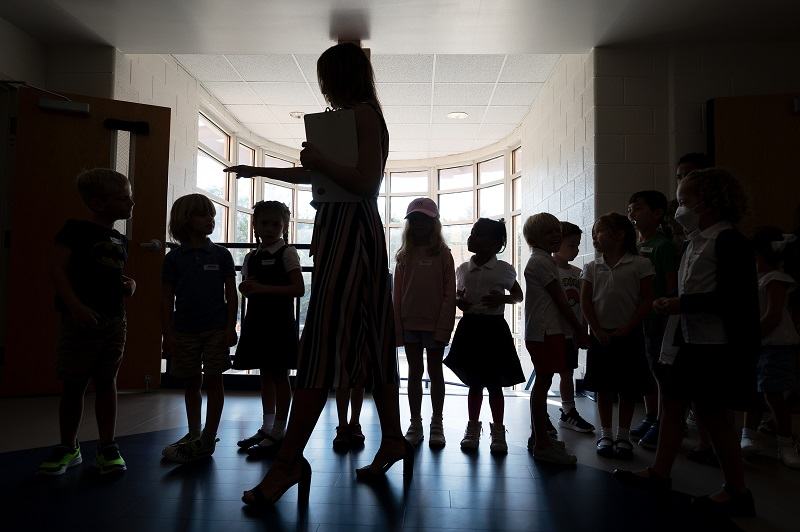
Photo by Craig Hudson for The Washington Post
13:26 JST, September 5, 2022
Here are some recent headlines: “Teachers are leaving the profession in droves.” “The teacher shortage is real, large and growing, and worse than we thought.”
Sounds bad, doesn’t it? Teachers need help. The training they get in many education schools is inadequate. They often suffer under dumb rules and clumsy administrators. My Washington Post colleague Valerie Strauss recently reported that average weekly teacher wages increased just $29 from 1996 to 2021, compared with a $445 increase in weekly wages for other college graduates.
But the mass departure from teaching that some predict seems unlikely. The stories underneath those headlines describe difficulties in filling vacancies in some districts, but many experts say this is old news and distorts a situation affecting mostly specialties.
“We have persistent shortages of math and science teachers, special education teachers, and language teachers, and we have had them for a long time,” said Eric Hanushek, a Stanford University economist who has been studying schools for decades. He said he has a book in his library fretting over the shortage of math and science teachers in 1962.
A national survey of more than 800 schools released by the U.S. Department of Education in August found an average of about three unfilled teacher openings per school in June. Some districts and states, though, say they are suffering the worst teacher shortages ever, with dozens and sometimes hundreds of vacancies.
Experts suggest some of the confusion grew from sudden changes in district practices during the pandemic. When schools shut classrooms in early 2020, the uncertainties forced a big reduction in hiring. Also, some teachers were sick or had to care for family members. When pandemic recovery funds reached schools in 2021, hiring resumed in a big way, putting the focus on vacancies.
Rand Corp. researcher Heather Schwartz said in a Brookings Institution report that “based on district leaders’ projections, teacher shortages will be widespread, but not acute, in most districts in the 2022-2023 school year.”
In the same report Brown University associate professor of education Matthew Kraft said getting good information is difficult. “As a nation, we lack reliable, timely and detailed data on K-12 teacher supply and demand,” he said.
I know many teachers who aren’t quitting. I asked them why. They gave me a much longer list of reasons for staying than I expected. Here is a sample.
“Teaching is a rich, challenging, beautiful, spiritual, fun, humbling and meaningful calling,” said Greg Jouriles, a California social studies teacher. Colleagues at his high school told him they thought the job helped them stay young and feel like firsthand participants in our democracy and years later led to warm thank-you letters from students that people in other vocations rarely receive.
William Horkan, a Northern Virginia math teacher who specializes in challenging low-income students, said “the reason I stay is because these are my students and someone has to fight for them.” Jordan Simmons, a business and technology teacher also in Northern Virginia, said he can never forget the moment he overheard a former student say to a co-worker: “That was my teacher in high school. He saved my life.”
A social studies teacher in New York City said he liked both the “generous vacations” and “the feeling that we’re part of something larger than ourselves.”
Mark Ingerson’s forensic teams at his central Virginia high school have won many state championships. He said he loves the work but also feels “there is a tipping point where once you have been teaching long enough, the retirement hit if you leave is so bad, you almost have to stay.”
A recent poll suggests a contradiction in our thinking about schools.
PDK International, a professional organization for educators, found that despite the ravages of the pandemic, Americans gave their community public schools the highest ratings in 48 years. How does that square with the fact that the percentage of respondents who said they did not want their child to be a teacher was the highest ever?
We like and respect the teachers we know, yet wonder how they can stand such hard work for relatively low pay. We need a better understanding of why good, smart people choose those jobs and stick with them.
I’m glad we appreciate the value of what teachers do. It might help to listen more carefully to what teachers say about their work before having anxiety attacks when our offspring say they might try it.
Top Articles in News Services
-

Survey Shows False Election Info Perceived as True
-

Prudential Life Expected to Face Inspection over Fraud
-

Hong Kong Ex-Publisher Jimmy Lai’s Sentence Raises International Outcry as China Defends It
-

Japan’s Nikkei Stock Average Touches 58,000 as Yen, Jgbs Rally on Election Fallout (UPDATE 1)
-

Japan’s Nikkei Stock Average Falls as US-Iran Tensions Unsettle Investors (UPDATE 1)
JN ACCESS RANKING
-

Japan PM Takaichi’s Cabinet Resigns en Masse
-

Japan Institute to Use Domestic Commercial Optical Lattice Clock to Set Japan Standard Time
-

Israeli Ambassador to Japan Speaks about Japan’s Role in the Reconstruction of Gaza
-

Man Infected with Measles Reportedly Dined at Restaurant in Tokyo Station
-

Videos Plagiarized, Reposted with False Subtitles Claiming ‘Ryukyu Belongs to China’; Anti-China False Information Also Posted in Japan























